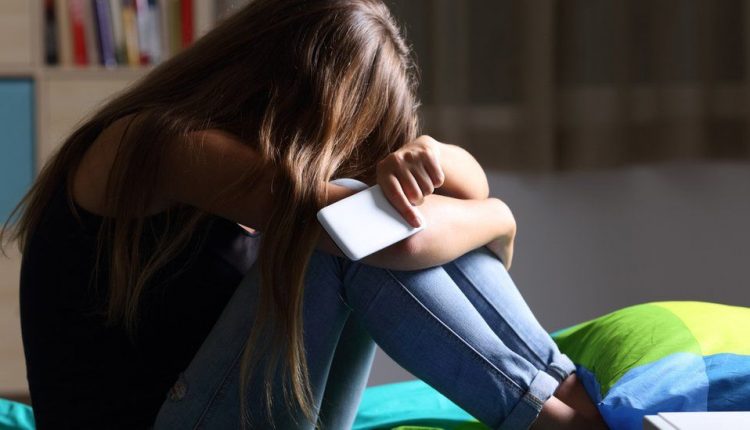Children’s mental health: ‘The type of self-harm is the worst we have seen’
By September the number of referrals made to Liverpool’s child and adolescent mental health services (CAMHS) team had already surpassed the more than 3,500 received during the whole of last year.
BBC North West Tonight has been given exclusive access to spend a day with the team – often the first point of contact for young people struggling with their mental health – at its Alder Hey Children’s Hospital unit.
We see, with our own eyes, the challenges facing those on the frontline.
It is just before 10:00 GMT one Tuesday morning in November and the phones are ringing.
Zoe Bentley, a senior mental health practitioner, picks up a call from a distraught mum, whose son is telling her every day that he wants to take his own life.
He is currently on the CAMHS waiting list.
Zoe tries to reassure her and, after 15 minutes on the phone, they have come up with a plan to bring him in for an emergency assessment by one of the clinical nurses.
“The earlier they do that and the earlier they receive that help and support,
the better the outcome for that child or young person.”
“When a child is expressing suicidal ideation every single day to a parent, you can imagine that’s really distressing for them,” says Zoe.
“But what parents sometimes overlook is that it’s a positive that their child feels able to communicate their feelings with them.
“We need to be able to empower those parents and give them safety plans but know we’re at the end of the phone any time – day and night – if it’s all getting too much.”

The team are trained specialists, ready to pick up the phone and help children and their families who find themselves in deep distress.
It is a hugely busy time for the team, with a 43% year-on-year increase in the number of referral calls.
“Most of the job is to try and reassure families and work with them to put a plan in place to deal with that current crisis,” says Ricky Zdrenka, a senior mental health practitioner.
“But sometimes you put the phone down and you have to take a really big breath in response to what you’ve just heard, which can be really traumatic for the staff to listen to, as well as for the families involved.”
The phone rings again. This time it is the hospital’s A&E department saying a young person has been brought in after taking an overdose.
A senior mental health nurse will later meet with them to assess the young person and work with them and their family to sort out a plan of action.

In recent months, what has shocked the team the most is the level of intent behind that self-harm and the age of the young people involved. Many are not even teenagers.
“The types of self-harm that we’re dealing with are different and worse than we’ve ever seen before,” says Dr Sally Al-Bachari, a consultant child and adolescent psychiatrist.
“The attempts to end life are ongoing and the most severe level we’ve ever experienced.”

Help and support
If you’re affected by any of the issues in this article you can find details of organisations who can help via the BBC Action Line.

Another phone call comes in from reception for Dr Alys Cawson.
She is told another young person has been brought in for an urgent assessment after an attempt to end their life.
“We’re still a bit concerned about their risk but we feel we can manage it in the community,” says Dr Cawson, speaking after the assessment.
“We’re going to offer a bit more crisis support, whilst they’re waiting to be seen by CAMHS.”

By 5pm, the team has seen three young people who arrived at A&E, and the same number of emergency referrals.
All but one had made serious attempts to harm themselves.
And the staff here are only halfway through their 12-hour shift.
Since April, nearly 400 children and young people have turned up at A&E because of their poor mental health.
- ‘We always try and make them feel at home’
- ‘The young people know when they are no managing’
- ‘Overcoming my silence led me into speech therapy’
The eating disorder team has seen one of the biggest increases, with a rise in inpatient admissions by more than 300% on pre-pandemic levels.
“What we have seen is waiting times for our core community-based services increase quite significantly,” says Lisa Cooper, director of community and mental health services.
“What we really want to do is make sure we support children and young people much earlier on, rather than waiting until they’re at rock bottom.”

More than 65% of the young people referred to CAMHS are seen within 18 weeks.
But that still leaves a third waiting more than four months for treatment.
To cope with the increased demand, the crisis team has taken on six extra members of staff and are looking to recruit more.
They are looking to carry out more home assessments to stop young people ending up in hospital.
The team is also expected move into its new hub next to the main hospital by the spring, bringing all mental health services together under one roof.
But while work continues on the unit’s new home, Dr Al-Bachari wants young people and their families to keep calling if they need help.
“That’s why we’re here. The biggest concern would be that people aren’t reaching out for help and support,” she says.
“The earlier they do that and the earlier they receive that help and support, the better the outcome for that child or young person.”
You can see more on this story on BBC North West Tonight at 18:30 GMT on Thursday 9 December 2021 and subsequently on the BBC iPlayer.


Comments are closed.